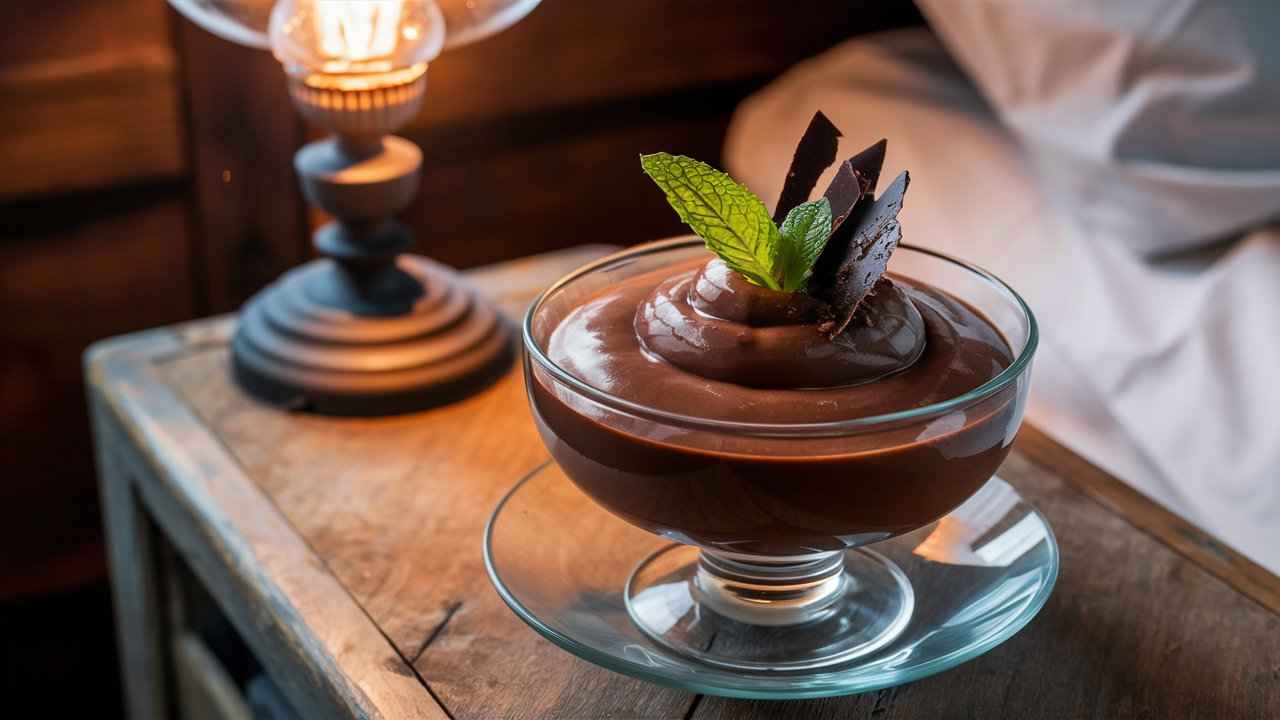Table of Contents
“Should you eat protein pudding before bed? 🍮 Discover its benefits, tips, and recipes for a satisfying, muscle-repairing nighttime snack! 💪”
“Should you eat protein pudding before bed?”. Picture this: you’re winding down after a long day, and the craving for a little something sweet hits. But instead of reaching for a sugary snack, you whip up a creamy bowl of protein pudding. Sounds perfect, right? Should you eat protein pudding before bed, though? Let’s break it down and see why this nighttime snack might just be the perfect choice. 🍮
1.Introduction to Protein Pudding and Nighttime Nutrition
1.What Is Protein Pudding?
Protein pudding is a high-protein dessert or snack that combines the creamy indulgence of traditional pudding with the nutritional punch of protein powder or shakes. It’s an easy-to-make treat that’s packed with nutrients, making it a favorite for fitness enthusiasts and dessert lovers alike. Plus, it’s versatile—you can customize flavors, toppings, and even the type of protein.
2.The Science Behind Nighttime Snacking
Eating before bed is often debated, but the key lies in what you eat. Protein-based snacks, like protein pudding, provide slow-digesting nutrients that fuel your body overnight. Unlike heavy meals or sugary treats, which can disrupt sleep, protein snacks are light and functional.eat protein pudding before bed. “Should you eat protein pudding before bed?”.
“Nighttime snacks don’t have to be your enemy. The right choices can actually enhance your health and recovery while you sleep.”
2.Benefits of Eating Protein Pudding Before Bed
1.Promotes Muscle Recovery Overnight
Protein is essential for repairing and building muscles, especially if you’ve worked out during the day. Casein, a slow-digesting protein often used in protein pudding, releases amino acids gradually, ensuring your muscles are fed throughout the night. Think of it as a repair crew working overtime while you rest! 💪
2.Helps Curb Late-Night Cravings
We’ve all been there—those late-night snack attacks that have us raiding the fridge. Protein pudding is a satisfying alternative that keeps you full and helps you avoid calorie-dense, sugary options. Instead of empty calories, you’re feeding your body something nutritious.
3.Supports Weight Management Goals
Did you know that protein can help you burn more calories even when you’re asleep? It boosts metabolism and helps preserve muscle mass, both of which are critical for weight management. Plus, a protein pudding before bed can prevent overeating the next morning by keeping hunger at bay. “Should you eat protein pudding before bed?”.
3.The Role of Protein in Nighttime Nutrition
1.Why Slow-Digesting Proteins Are Ideal Before Bed
Not all proteins are created equal. Slow-digesting proteins like casein are perfect for nighttime because they provide a steady release of amino acids for several hours. This means your muscles stay nourished and repaired while you’re in dreamland.
2.Casein Protein: The Bedtime Powerhouse
Casein protein is often called the “bedtime protein” for good reason. It forms a gel in your stomach, slowing digestion and keeping you feeling full longer. When added to protein pudding, it creates a thick, creamy consistency that’s both delicious and effective.
3.Comparisons Between Protein Pudding and Other Snacks
When it comes to nighttime snacks, not all options are equal. Here’s how protein pudding stacks up:
| Snack | Benefits | Drawbacks |
|---|---|---|
| Protein Pudding | High in protein, customizable, satisfying | Requires preparation |
| Sugary Desserts | Convenient, sweet | High in sugar, may disrupt sleep |
| Fruits | Low-calorie, nutritious | Low protein, not filling for long |
| Nuts/Seeds | High in healthy fats, protein | High calorie if consumed in excess |
“Compared to other snacks, protein pudding strikes the perfect balance between indulgence and functionality.” “Should you eat protein pudding before bed?”.
4.Common Concerns About Eating Before Bed
1.Does Eating Before Bed Cause Weight Gain?
One of the biggest myths is that eating at night automatically leads to weight gain. However, it’s not when you eat but what you eat that matters. A protein-packed snack like protein pudding can actually support weight management by preventing overeating later.
2.Is Protein Pudding Easy to Digest Late at Night?
For most people, protein pudding is gentle on the stomach, especially if you use easily digestible proteins like casein or plant-based options. However, if you have sensitivities, opt for non-dairy or low-lactose ingredients to ensure a restful night.
3.Balancing Calories with Nutritional Needs
While protein pudding is healthy, portion control is essential. Eating a large bowl of pudding loaded with toppings could tip the calorie scale. Stick to a serving size that fits your dietary goals. “Should you eat protein pudding before bed?”.
5.How to Choose the Right Protein Pudding for Nighttime
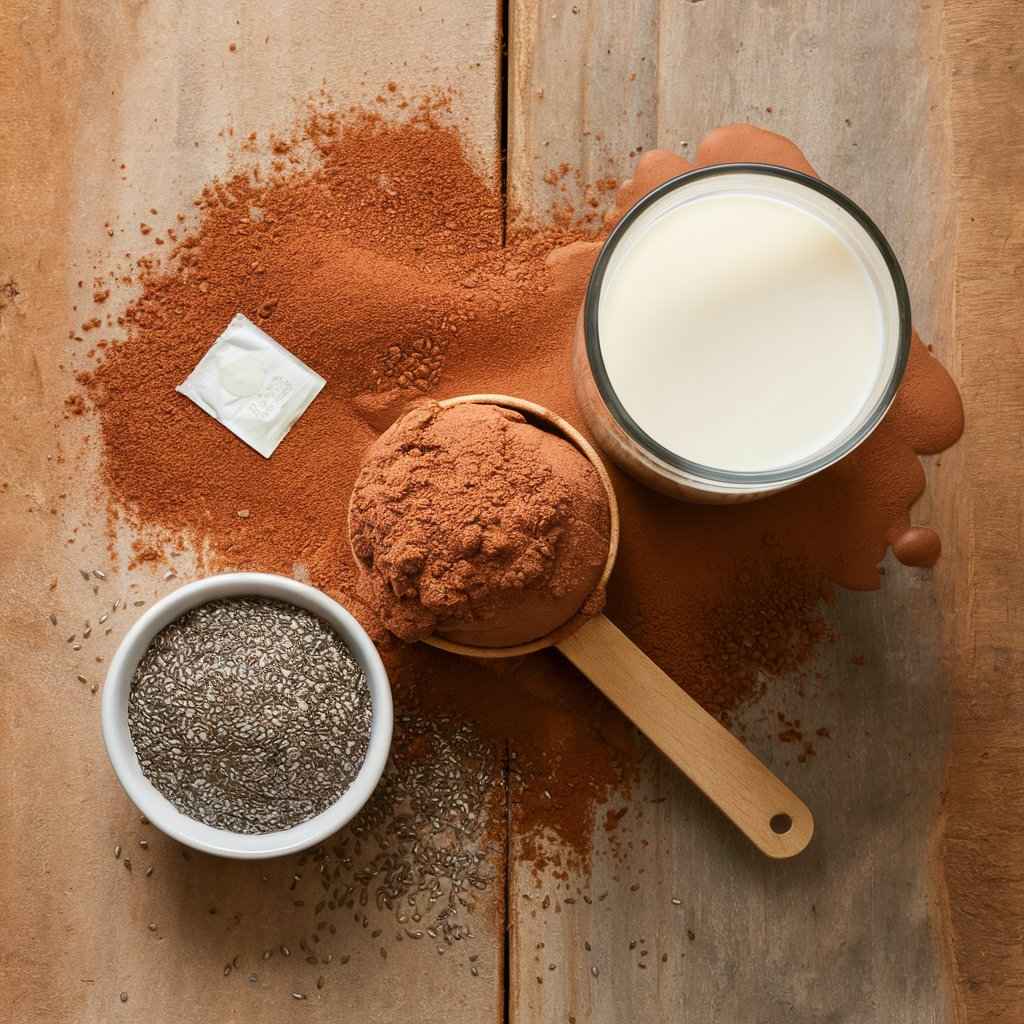
1.Low-Sugar and Low-Calorie Options
Look for recipes or store-bought options that are low in sugar to avoid a spike in blood sugar levels before bed. Natural sweeteners like stevia or monk fruit are great alternatives.
2.Best Types of Protein for Bedtime Pudding
- Casein Protein: Ideal for slow digestion and muscle repair.
- Whey Protein: Quick digesting but still a good option for light pudding.
- Plant-Based Protein: Great for vegans or those with dairy sensitivities. 🌱
Ingredients to Look For and Avoid
| Include | Avoid |
|---|---|
| Casein or plant-based protein | High-sugar additives |
| Natural sweeteners | Artificial flavors |
| Healthy thickeners (chia) | Heavy creams or fats |
“Choosing the right ingredients can make all the difference in how your body responds to a bedtime snack.” “Should you eat protein pudding before bed?”.
6.Step-by-Step Guide to Making Bedtime-Friendly Protein Pudding
If you’re ready to make protein pudding part of your nighttime routine, here are three easy recipes to get you started.
1.Classic Chocolate Casein Pudding Recipe
This recipe is perfect for chocolate lovers who want a creamy, rich treat before bed.
Ingredients:
| Ingredient | Quantity |
|---|---|
| Chocolate Casein Protein | 2 scoops |
| Almond Milk | 1 cup |
| Cocoa Powder | 1 tbsp |
| Stevia | 1 tsp (optional) |
| Cornstarch | 1 tbsp |
Directions:
- Combine Ingredients: In a saucepan, mix the protein powder, cocoa powder, and cornstarch.
- Add Liquid: Gradually whisk in the almond milk until smooth.
- Cook: Heat over medium, stirring constantly, until the mixture thickens.
- Sweeten: Add stevia if you prefer a sweeter taste.
- Chill and Enjoy: Pour into bowls, refrigerate for 1-2 hours, and enjoy! 🍫
2.Dairy-Free Vanilla Protein Pudding Recipe
This recipe is ideal for those looking for a lighter, dairy-free option.
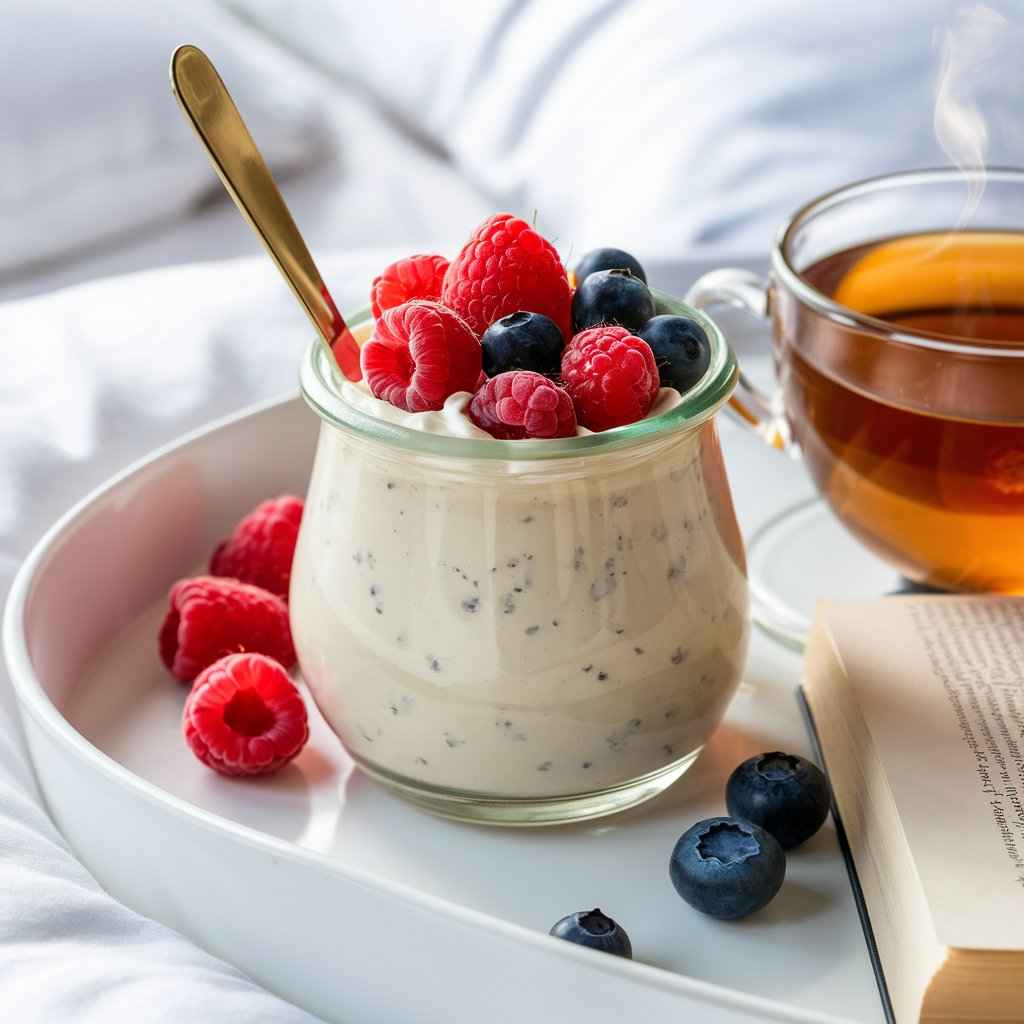
Ingredients:
| Ingredient | Quantity |
|---|---|
| Vanilla Plant-Based Protein | 2 scoops |
| Coconut Milk | 1 cup |
| Vanilla Extract | 1 tsp |
| Chia Seeds | 1 tbsp |
| Maple Syrup | 1 tbsp |
Directions:
- Blend all ingredients until smooth.
- Pour the mixture into jars or bowls.
- Refrigerate for at least 2 hours to thicken.
- Top with fresh fruit for extra flavor. 🍓
3.High-Fiber Berry Protein Pudding Recipe
This recipe combines the benefits of protein and fiber for a filling nighttime snack.
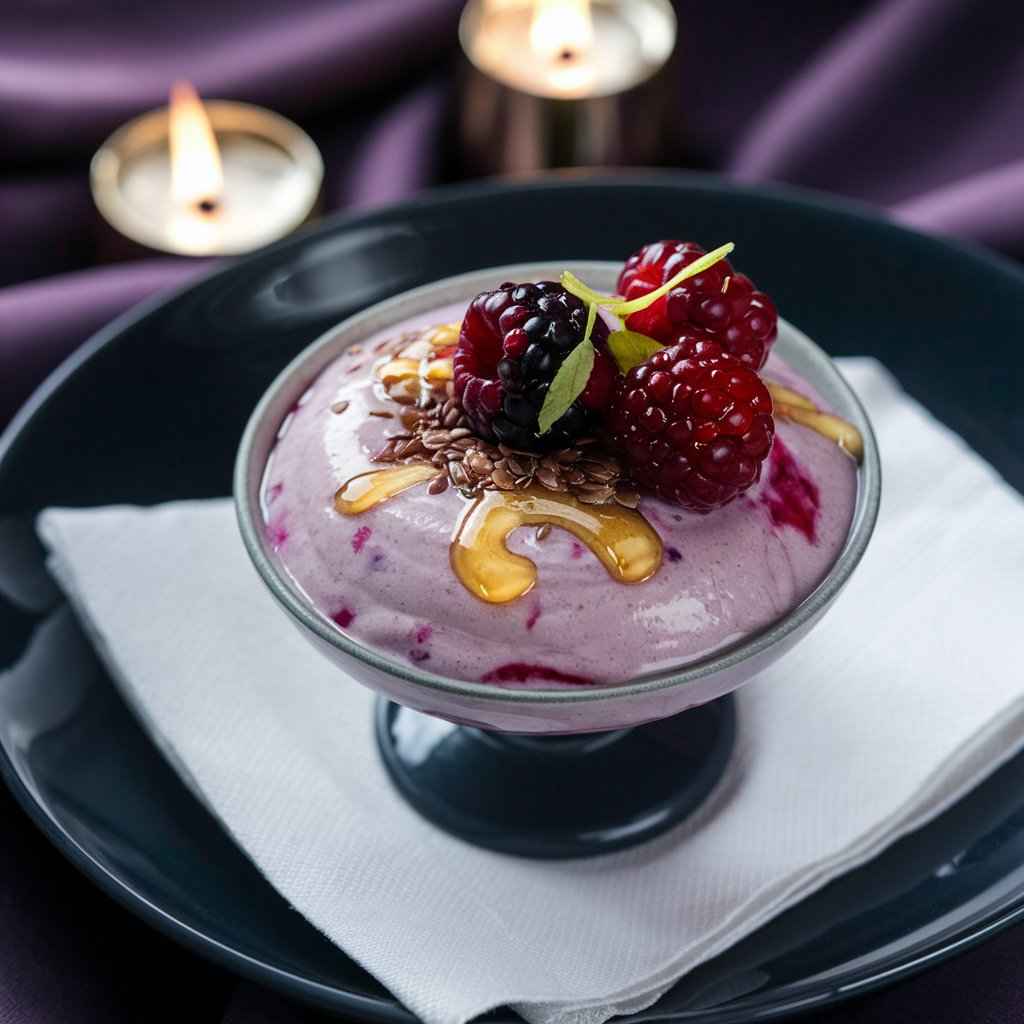
Ingredients:
| Ingredient | Quantity |
|---|---|
| Berry-Flavored Protein Powder | 2 scoops |
| Greek Yogurt | 1 cup |
| Fresh Berries | 1/2 cup |
| Flaxseed Meal | 1 tbsp |
| Honey | 1 tbsp |
Directions:
- Mix the protein powder and Greek yogurt until smooth.
- Stir in the flaxseed meal and half the berries.
- Refrigerate for 1 hour.
- Serve topped with the remaining berries and a drizzle of honey. “Should you eat protein pudding before bed?”.
7.Common Problems and Solutions for Bedtime Protein Pudding
Even with the best recipes, you might encounter a few hiccups. Let’s troubleshoot!
1.How to Avoid Overly Sweet or Rich Puddings
- Problem: The pudding tastes too sweet or heavy.
- Solution: Use unsweetened protein powders and rely on natural sweeteners like honey or stevia. Reduce rich ingredients like cocoa or peanut butter.
2.What to Do if Pudding Feels Heavy Before Sleep
- Problem: You feel too full after eating protein pudding at night.
- Solution: Stick to smaller portions and use lighter ingredients, such as almond milk instead of heavy cream.
3.Tips for Balancing Flavors and Textures
- Add a pinch of salt to balance sweetness.
- For a smoother texture, blend the pudding mixture thoroughly or use a blender.
- Experiment with toppings like nuts, seeds, or fruit to enhance both taste and texture. “Should you eat protein pudding before bed?”.
“Making minor tweaks to your recipe can turn a good pudding into a great one!” “Should you eat protein pudding before bed?”.
8.Creative Ways to Incorporate Protein Pudding into Your Routine
Protein pudding doesn’t have to be boring. Here are some creative ways to enjoy it:
1.Protein Pudding Parfaits with Relaxing Toppings
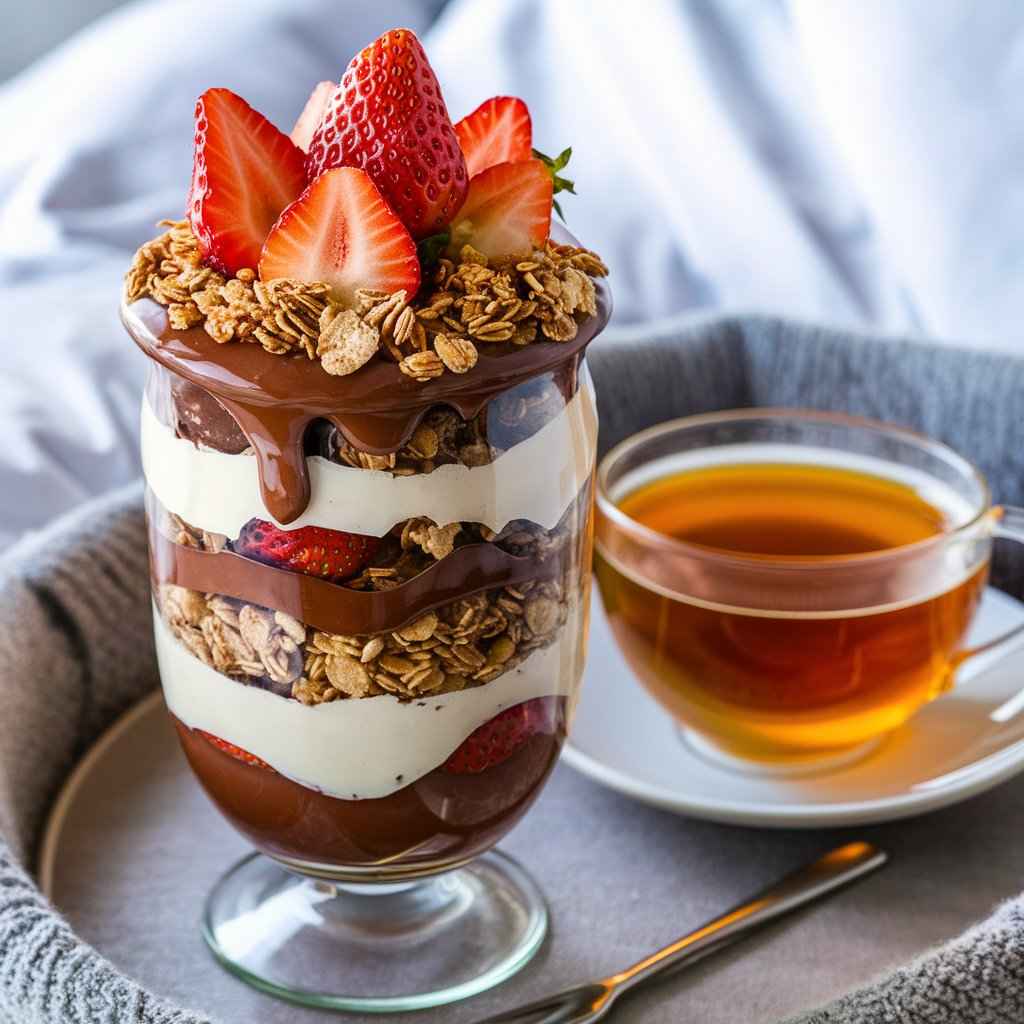
Layer your pudding with granola, berries, and yogurt in a glass jar for a parfait that’s both nutritious and Instagram-worthy. Add calming toppings like chamomile-infused honey or lavender sprinkles for a sleep-friendly touch. 🌿 “Should you eat protein pudding before bed?”.
2.Pairing Protein Pudding with Herbal Tea for Better Sleep
Enjoy your pudding alongside a warm cup of herbal tea, like chamomile or peppermint. The soothing tea enhances relaxation while the pudding keeps you satisfied. ☕
3.Using Protein Pudding as a Post-Dinner Dessert
Treat your protein pudding as a dessert by adding toppings like dark chocolate chips, coconut flakes, or a dollop of whipped cream. This way, you satisfy your sweet tooth while staying on track with your fitness goals. “Should you eat protein pudding before bed?”.
9.FAQ About “Should you eat protein pudding before bed?”.
1.Is Protein Pudding Suitable for All Diets?
Yes! Protein pudding can be customized to suit any diet:
- Vegan: Use plant-based protein powders and almond or oat milk.
- Keto: Choose unsweetened protein powder and low-carb sweeteners like erythritol.
- Gluten-Free: Ensure all ingredients are certified gluten-free.
2.How Much Protein Should You Consume Before Sleep?
A serving size of 20–40 grams of protein is generally recommended for nighttime. This amount supports muscle repair without overloading your system. “Should you eat protein pudding before bed?”.
3.Can You Replace Dinner with Protein Pudding?
While protein pudding is nutrient-dense, it’s not a complete meal. Pair it with a small salad or steamed veggies to make it more balanced if replacing dinner.
“for recipes what-makes-pizza-hut-cheese-sticks-so-special”
10.Conclusion: “Should you eat protein pudding before bed?”.
“Should you eat protein pudding before bed?”. So, should you eat protein pudding before bed? For most people, it’s a fantastic option that promotes health and satisfies hunger without disrupting sleep.
1.Recap of Benefits and Considerations
Eating protein pudding before bed can support muscle recovery, curb late-night cravings, and help you achieve your weight management goals. With the right ingredients and portion sizes, it’s a healthy and satisfying addition to your nighttime routine.
2.Encouragement to Experiment with Recipes and Routines
Don’t be afraid to experiment! Try different recipes, flavors, and toppings to find the combination that works best for you. A little creativity can make your bedtime snack the highlight of your day. 🍮
“Should you eat protein pudding before bed?”.

